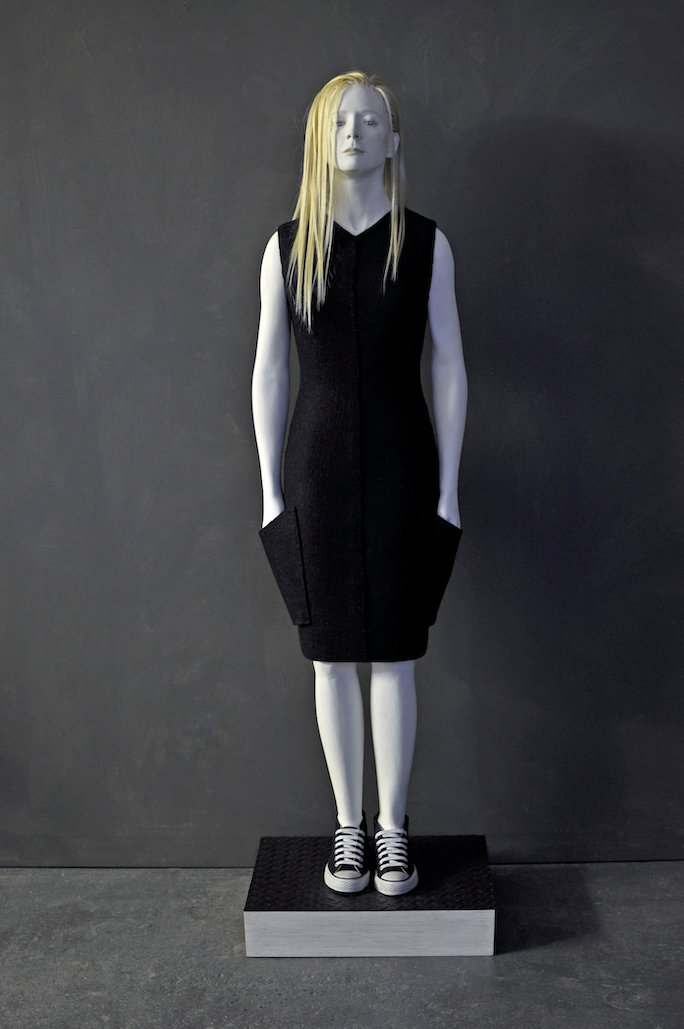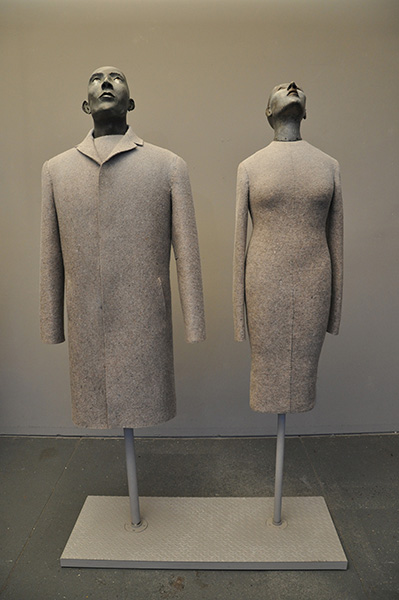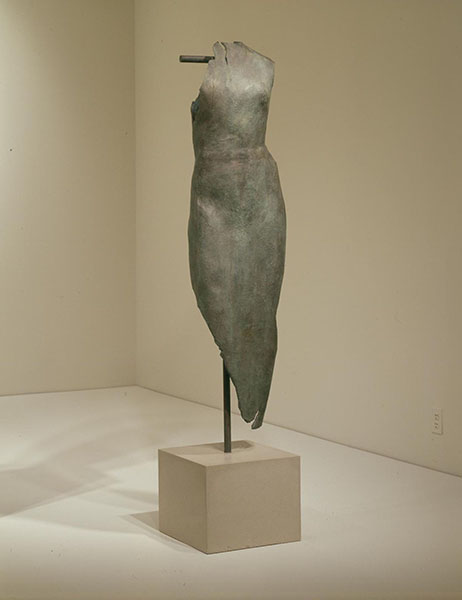
Easy Does It, 2014, carved polystyrene foam, carved balsa, felt, paper clay, paint, rubber, synthetic hair, and modified Converse All s]Star sneakers, 69 ½ x 20 x 16 inches.

Lower Manhattan Classic, 2006-09, bronze, felt, other media, 75 x 48 x 20 inches.

Shield, 1989, bronze, stone, 72 x 15 x 15 inches. Collection of Sheldon Museum of Art, Lincoln, NE.
OAKLAND, CALIFORNIA—September 30, 2011—The Artists’ Legacy Foundation is pleased to announce that its fifth annual Artist Award of $25,000 will be presented to noted American sculptor Judith Shea. The Artist Award recognizes and honors the accomplishments of an outstanding visual artist whose primary medium is painting or sculpture.
For more than three decades Judith Shea has made a study of the human form in many guises and materials. From simple, iconic textile ‘clothes’, and hollow bronze forms around an absent figure, to carved wooden ‘anti’ monuments, her work has often ironically quoted art history to comment on life now.
Each year, ten artists, either painters or sculptors, are nominated anonymously by five nominators for the Artist Award. This year the Foundation’s panel of jurors included Nene Humphrey, artist who works in multiple media; Katherine Sherwood, painter, and Lilly Wei, art critic. The nominators and the jurors are art world peers who are chosen for their expertise. The 2011 jurors agreed: “It was very difficult to select the award recipient because all nominees were very skilled and extremely worthy.”
Judith Shea has been a practicing artist for over 30 years. Ms. Shea was born in Philadelphia, PA in 1948 and has resided in New York City since 1967. Her nominator wrote: “Judith Shea’s becoming a sculptor is a unique story. Her early training was as a clothing designer. She has a degree in Fashion Design from the Parsons School of Design and later earned a B.F.A. from Parsons/the New School for Social Research. In fact, Judith never became a fashion designer because becoming a sculptor was much more satisfying.”
Although Shea did not pursue fashion, she credits that early Parsons training as crucial to her understanding of how to build the figure in 3D. Her works of the 1970s were made of cloth and suggested unassembled pattern pieces. By 1981, influenced by research for a lecture on early medieval armor, and seeking to bring more volume into her cloth works, she began casting in iron, and bronze. From this technology emerged the headless, armless hollow sheaths, symbolizing women, and the voluminous overcoats which were male surrogates. Juxtaposing the figure with abstract forms, and then pairing figures, gave added psychological complexity to her work. By the 1990s, to allow for the inclusion of the complete figure – heads, etc., she added another medium, carved wood. In this material she explored the sculptural tropes which had been tossed by Modernism; the statue, and the monument, seeking to inject contemporary meaning into these ancient forms. By 1995, after her Rome Prize year in Italy, she had created two carved wooden equestrians, along with a number of other “anti-monuments”.
Following her Italian experience, she traveled to Oaxaca, Mexico where she encountered churches full of the figures of saints, all of them newly dressed in handmade clothes. Shea had been brought up as a Catholic and, as she said, “The first sculptures that I ever saw were not in museums but figures in churches.” After her return to New York, she began to revisit the use of cloth and clothes from her early works, and to incorporate it into her new work, combining many of the materials and skills she had acquired in her career’s long journey.
After 9/11, Shea began a body of work she calls ‘The Legacy Collection’ provoked by the imagery and media saturation of the catastrophic events of September 11 and her response to it. A near-by resident of, and eye witness to the event, she wanted to impart the intimate reality, rather than the spectacular one. Her carved, mannequin-like figures, stitched into grey industrial felt, paired, like twins, dust-saturated, and shocked, with their faces uplifted, as if in expectation, become expressive and narrative, rather than glamorous and promotional. “This series,” in her nominator’s words, “brings together all of Judith’s concerns from the beginning of her career as a sculptor to the present.” Her sculptures today convey powerful imagery that goes beyond its formal sculptural quality to communicate personal and societal issues.
Judith Shea’s work is well represented in museum collections including the Hirshhorn Museum and Sculpture Garden, Washington, DC; the Metropolitan Museum of Art, New York City; the Museum of Modern Art, New York City; the National Gallery, Washington, DC; the Whitney Museum of American Art, New York City; and the Walker Art Center, Minneapolis. Solo exhibitions of her work have taken place at the Laumeier Sculpture Park and Museum, St. Louis; the Museum of Contemporary Art, San Diego; the National Museum of Women in the Arts, Washington, DC; the Nelson-Atkins Museum of Art, Kansas City; and the Pennsylvania Academy of Fine Arts, Philadelphia, as well as at a number of other American museums. Throughout her career, she has been represented in group exhibitions including important shows at the Barbican Art Centre, London; Centro Cultural de Arte Contemporaneo, Mexico, DF; the Guggenheim Museum, New York; The Museum of Fine Arts, Houston; PS1 Contemporary Art Center, Long Island City, New York; the Sheldon Museum of Art, Lincoln, Nebraska; and the Santa Barbara Museum of Art, Santa Barbara, California, to name a few.
Awards include the National Academy’s Dunwiddie Prize in Sculpture; The Rome Prize, Trustees Award; The Rockefeller Foundation Fellowship to Bellagio, Italy; The Solomon R. Guggenheim Museum’s Sculptor in Residence at Chesterwood, MA, and two National Endowment for the Arts Fellowships in Sculpture.
Ms. Shea has given back to her community by teaching at Yale University, New York University, The San Francisco Art Institute, the School of the Museum of Fine Arts Boston, Parsons School of Design, Skowhegan School, and the University of Pennsylvania. She currently serves on the Exhibition Committee of the National Academy in New York.
Ms. Shea was surprised by the award and when reached by phone said: “Receiving the Artists’ Legacy Foundation’s 2011 Artist Award is a total surprise, and I am so pleased that I was selected. It means a great deal to me.” A ceremony honoring the artist will take place in the San Francisco Bay Area during November.
